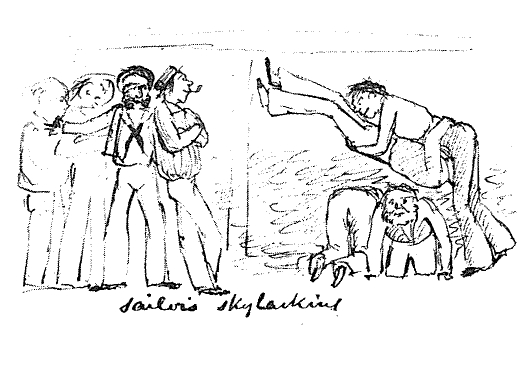On land
It is one week into the grand experiment of colonisation and things are not going well at Nepean Bay. Samuel Stephens and Captains Morgan and Ross have their hands full, with both the company men and the crews of both ships ‘very troublesome, impertinent, idle and dissatisfied’ in Stephens’ words. The unloading is going slowly and Stephens has hardly a good word to say for anybody, except Henry Wallan, whom he describes as ‘really a worthy fellow’. Some of the Island’s other inhabitants are making their presence felt as well and Stephens is beset on all sides. ‘The Rats, Ants, and divers other rational and irrational beings are being very troublesome’ he confides to his diary. Quarrelling and drunkenness amongst both crews and company employees is getting out of hand. Mind you, tempers may not have been improved by Stephens‘ habit of rousing everyone at 5.45 am, in the cold darkness of a July morning, with a rousing ‘morning call’ on his trumpet, especially if most of the men were nursing hefty hangovers from carousing the night before!

Sailors skylarking by Edward Snell, 1849.
Things come to a head on the night of 13 August. The crews have had a day off for ‘a ramble’, but seem, instead, to have purloined enough rum to get themselves thoroughly drunk and belligerent. Attempts to get them back on board fail and things continue to degenerate, with ‘quarrelling, fighting, and obscene and blasphemous and threatening language’, culminating in threats to raid the company stores for yet more rum. Stephens can find only two men he can trust, but he arms them and himself and mounts guard on the stores until 7 am the following morning, ‘being the whole time in momentary expectation, spite of my efforts to prevent it, of being compelled to fire upon the poor depraved and deluded beings by which I was surrounded.’ With the dawn comes peace, or perhaps just exhaustion. It has been quite an eventful first week!
At sea
It seems that discord amongst the passengers is plaguing all of the ships this week. The Tam O’Shanter has a problem with petty theft, while on board the Cygnet Finniss and Kingston continue to disagree on just about everything. As arguments amongst the men spill over into violence, Finniss blames the demon drink, but hints darkly that the behaviour of the cabin passengers is little better.
On the Africaine the rum ration is also causing problems. The Gougers‘ servant Margaret Clarke is reprimanded for ‘Probably flirting. lightness of conduct towards the sailors ‘, and soon afterwards exhibits alarming symptoms of mental disturbance. But in the end it seems that she is merely drunk. Like many of the other female emigrants, the daily rum ration is more than she is used to. Robert Gouger and the captain decide to withdraw the rum ration from the women and children, a decision that is very unpopular at first. But Gouger is convinced that ‘poor people’ should not be served ‘spiritous liquors’ at sea. It makes them lazy and fractious. Gentlemen, he implies, can manage their drink. We should hope so, because they seem to consume an awful lot of it!
On the Buffalo the trials seem to be of a lesser nature. George Stevenson endures the ‘punishment’ of a musical evening, provided with the assistance of an ‘indifferent piano’. He notes that the ladies are gradually becoming more reconciled to the inconveniences of shipboard life, but adds the patronizing comment that ‘it does require some physical strength as well as moral courage to endure the annoyances inseparable from a sea voyage.’ The ‘ladies’, by implication, exhibit neither!


Ah, the things our school teachers never taught us in the 1940s about the South Australian First Fleet! The demon rum was always confined to that rabble which landed at Port Jackson – mainly convicts and loose women! Having read the diaries and logs so far I am simply surprised firstly that the expedition to settle in South Australia ever reached these shores, and having done so, actually succeded in establishing a colony. We were always taught that the Buffalo arrived at Holdfast Bay, that there was a service at the Old Gum Tree, and that everyone lived happily ever after. Vive la difference! Many thanks, History SA. Marvellous stuff.